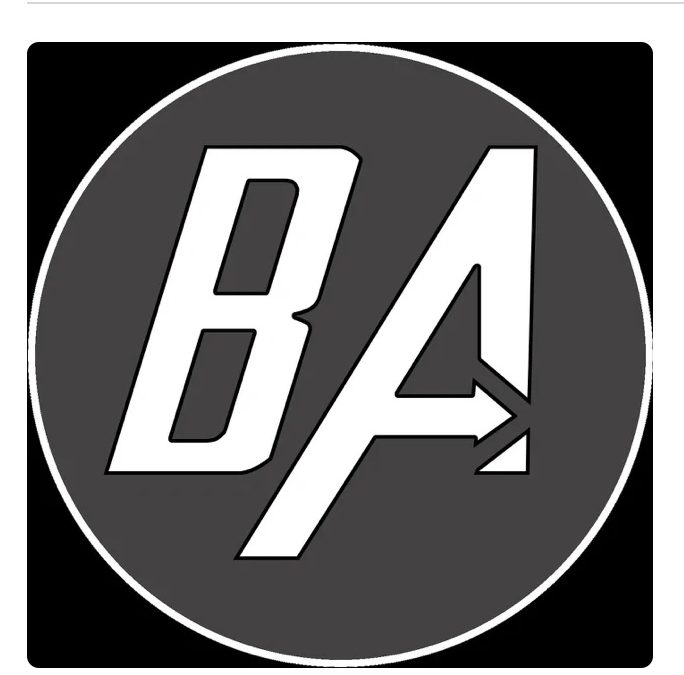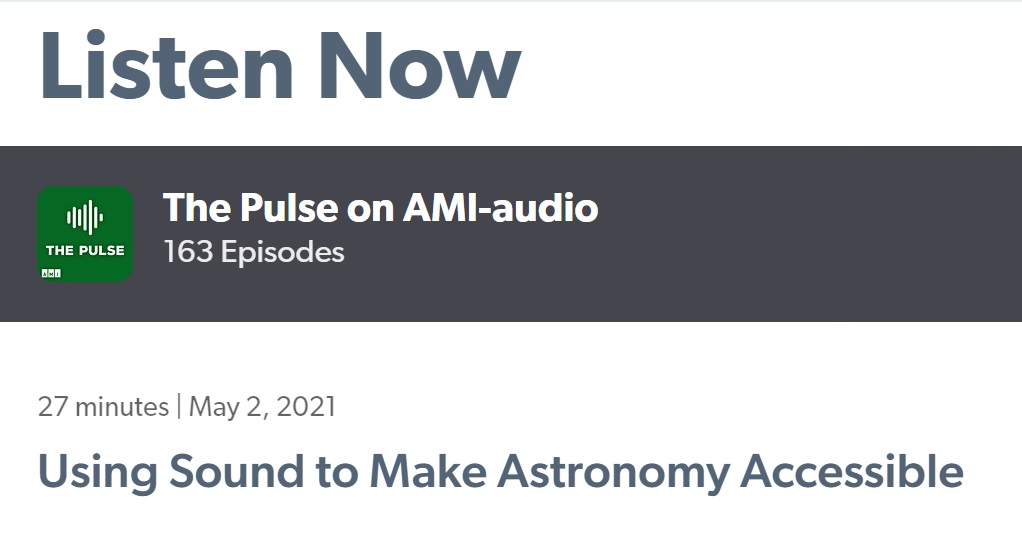
If intelligent life without sight were to exist on some distant planet in our galaxy, these lifeforms would still explore the universe; how?
IDATA, officially known as Research Supporting Multisensory Engagement by Blind, Visually Impaired, and Sighted Students to Advance Integrated Learning of Astronomy and Computer Science, is a NSF STEM+C project (1640131). The aim of the project is to explore computational thinking in astronomy and to build an inclusive community of practice centered on the common goal of design and production of accessible astronomical software, along with the necessary supports for an impactful educational experience for diverse learners.


Major project goals include:
- Exploring computational thinking and learning in astronomy
- Engaging students in authentic software design/development and understanding its impact
- Designing and developing astronomical image/data analysis software that is accessible to people who are blind and visually impaired (BVI)
- Developing curricular resources to support computation in astronomy and software use
The accessible software and instructional modules and tutorials produced by the project may be adopted by a range of BVI and sighted individuals, but may also be transferable to other similarly visually-intensive domains such as satellite, geophysical, and medical imaging.
Through authentic student engagement in the software design and development process, the project is exploring an innovative approach to improving knowledge, skills, self-efficacy and interest (including career interest) in astronomy, computing science, and the creation of tools that use the user-centered design (UCD) processes to increase accessibility for all.


The IDATA curricular materials and community building activities are paying particular attention to girls and traditionally underrepresented groups, in particular blind and visually impaired (BVI) students, helping them come to see themselves as doers of STEM+C. IDATA highlights computing in astronomy, engaging a community of diverse students in astronomical explorations and improving access to Astronomy+C for all.
Education Research Focus
IDATA’s education research assesses the extent and ways in which participation in IDATA influences (1) students’ understanding of computational thinking, (2) students’ understanding and use of computing in astronomy, and (3) students’ interest in and attitudes about computing science, astronomy, and STEM+C careers, including their perceptions of their own and others’ abilities in these areas.
Students in grades 6-12, working in 13 teacher-led groups, participated in the project. Participants were spread across several US states, both near the Yerkes Observatory (WI and IL), and further afield (CA, FL, MA, NM, OR, TX, WY). Some groups integrated IDATA activities into regular classes, and others operated as extracurricular clubs. The project also worked with 8 undergraduate near-peer mentors, who engaged with students to support their learning.


IDATA identified, adapted, or created BVI accessible instruments to measure students’ astronomy knowledge, knowledge of computational thinking, and students’ attitudes, beliefs and identity. These instruments were administered as baseline and follow-up assessments. To measure individual and group engagement in IDATA activities, teachers and undergraduate mentors completed logs of group sessions, and project staff conducted on-site observations of a sample of group sessions, collected website analytics and student work submissions from online activities, and interviewed teachers and undergraduate mentors about their experiences. A subset of students also participated in focus groups at the end of their IDATA experience. Release of research results is anticipated in summer or fall 2020.

The Universe Just Became More Accessible
The Universe Just Became More Accessible - Meet Timothy Spuck and the IDATA Project and their New AfterGlow Access Software for the BVI. Full Transcript Timothy Spuck from Associated Universities Inc.(AUI),, joins Jeff Thompson in the Blind Abilities studio, and talks...

Listen Now: Using Sound to Make Astronomy Accessible.
Tim Spuck from Associated Universities Inc., talks about new software that aids visually impaired and blind astronomers by converting images into soundscapes in real time. This software is one means of making astronomy and other sciences accessible to People with...
AWARDS
Innovators Developing Accessible Tools for Astronomy (IDATA) won the Public Choice award in the 2019 STEM for All Video Showcase.

Let’s make a difference together
For more information or to receive updated news about IDATA, please contact the IDATA Leadership Team using the contact form.








IDATA Teacher collaborators in the U.S. include Amanda Allen, Jacqueline Barge, Holly Bensel, Neal Boys, Tim Fahlberg, Kristin Grender, David Lockett, Matthew McCutcheon, Caroline Odden, Michael Prokosch, Kara Rowbotham, Rick Sanchez, and Barbara Stachelski. IDATA Student collaborators in the U.S. include Evan Blad, Naleah Boys, Ellen Butler, Jayden Dimas, Riley Kappell, Joseph Murphy, Logan Ruby, Alex Scerba, Charlize Sentosa, Meg Sorensen, Remy Streichenberger, Trevor Warren, and others. IDATA Undergraduate Mentors include Tia Bertz, Katya Gozman, Chris Mathews, Kendall Mehling, Andrea Salazar, Ben Shafer, Alex Traub, and Sophia Vlahakis. Special thanks to the IDATA external advisors including Nic Bonne, Al Harper, Sue Ann Heatherly, Russ Laher, Luisa Rebull, Ed Summers and Kathryn Williamson.
